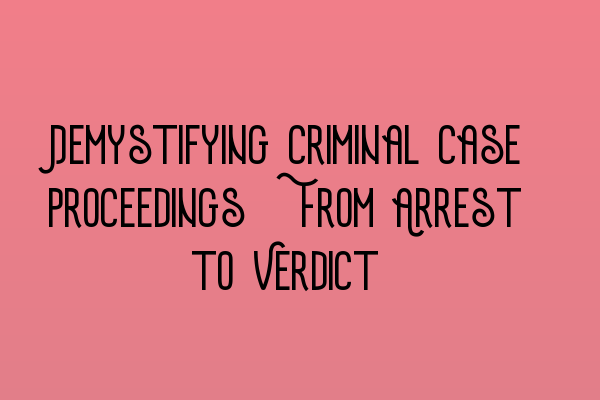Demystifying Criminal Case Proceedings: From Arrest to Verdict
Being involved in a criminal case can be a daunting experience. The legal jargon, complex procedures, and the fear of the unknown can leave individuals feeling overwhelmed and confused. At SQE Criminal Law & Practice Law UK, our aim is to demystify the criminal case proceedings and provide you with a clear understanding of the process from start to finish.
Arrest and Investigation
It all begins with an arrest. When a person is suspected of committing a crime, they may be apprehended by law enforcement officials. The individual will then be taken into custody and the investigation will commence. This phase involves gathering evidence, interviewing witnesses, and examining the crime scene in order to establish the facts of the case.
For more detailed information on the arrest and investigation process, you can refer to our article on SQE 1 Practice Mocks FLK1 FLK2.
Charges and Bail
Once the investigation is complete, the prosecuting authority will review the evidence and decide whether to proceed with formal charges. If charges are filed, the accused will be brought before a court to be formally informed of the charges against them. At this stage, the court will also consider whether the accused should be granted bail or remanded in custody until the trial.
Our article on SQE 2 Preparation Courses provides comprehensive information on the various types of bail and the factors considered by the court when making a decision.
Pre-Trial Proceedings
Before a trial begins, there are several pre-trial proceedings that take place. These include case management hearings, where the judge ensures that both the prosecution and defense have met all the necessary requirements and are ready to proceed to trial. Additionally, any pre-trial motions or applications, such as requests for disclosure of evidence, may be made during this phase.
For further insights into pre-trial proceedings, you can read our article on SQE 1 Preparation Courses.
The Trial
The trial is the most well-known phase of a criminal case. This is where the prosecution presents its evidence and arguments, and the defense has the opportunity to challenge the evidence and present its own case. The accused is presumed innocent until proven guilty, and the burden of proof rests with the prosecution to establish guilt beyond a reasonable doubt.
For a detailed understanding of the trial process, you can refer to our article on SQE 2 Preparation Courses.
The Verdict and Sentencing
After the trial, the court will deliver its verdict. If the accused is found guilty, the court will proceed to sentencing. Sentences can vary widely depending on the nature of the crime and the circumstances surrounding it. The court may consider factors such as the individual’s previous criminal record, the impact of the crime on the victim, and any mitigating factors presented by the defense.
For more information on sentencing in criminal cases, you may find our article on SRA SQE Exam Dates useful.
Appeals and Post-Trial Proceedings
If the accused is dissatisfied with the verdict or the sentence, they may choose to appeal the decision. Appeal proceedings involve a review of the trial transcript and the arguments put forward by both sides in order to determine whether any errors were made that could have affected the outcome of the trial.
For a comprehensive understanding of the appeals process and post-trial proceedings, you can explore our related articles on SQE 1 Practice Exam Questions.
Conclusion
Criminal case proceedings can be complex, but with the right knowledge and guidance, they can be better understood. By familiarizing yourself with the different stages of a criminal case, you can navigate this challenging process with confidence.
If you have any further questions or require legal assistance, do not hesitate to contact our team of experienced criminal law solicitors at SQE Criminal Law & Practice Law UK.
